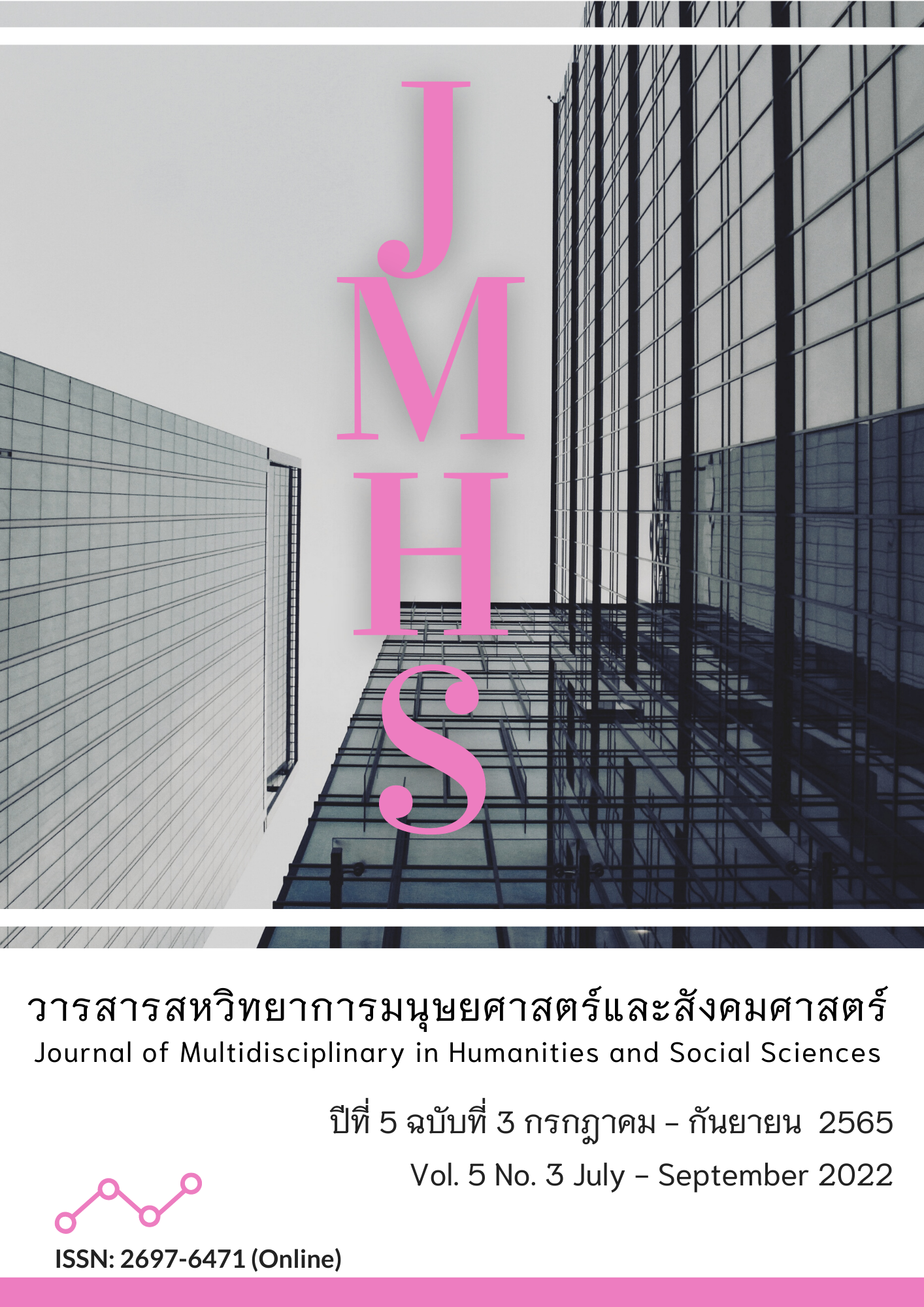The Readiness Indicators for Special Ability Child Educational Management of The Kindergarten Provincial School
Main Article Content
Abstract
This article aimed to study 1) the readiness indicators for special ability child educational management at the kindergarten provincial school; and 2) the confirmation of the readiness indicators for special ability child educational management at the kindergarten provincial school is descriptive research. The sample group consisted of 70 provincial kindergartens. The data were analyzed using corroborative factor analysis and the statistical indicators used in the data analysis consisted of frequency, percentage, mean, arithmetic mean, standard deviation, corroborative component analysis, and content analysis
The findings of this study revealed that: 1. The readiness indicators for special ability child educational management in the kindergarten provincial school composed of 8 dimensions and 56 indicators: 1) the dimension of cooperative among school, parents and related sections, composed of 7 indicators, 2) the dimension of specialize person, composed of 6 indicators, 3) the dimension of curriculum and instruction, composed of 8 indicators, 4) the dimension of planning for children with special ability, composed of 9 indicators, 5) the dimension of systemic of data and information, composed of 7 indicators, 6) the dimension of media and technology readiness, composed of 7 indicators, 7) the dimension of school plant and budgeting composed of 5 indicators, and 8) the dimension of evaluation for development and auditing, composed of 7 indicators, and 2. The confirmation of components and readiness indicators for special ability child educational management the kindergarten provincial school found out that all experts consensus that 8 dimensions, 56 indicators were accuracy, appropriately, possibility, and utility.
Article Details

This work is licensed under a Creative Commons Attribution-NonCommercial-NoDerivatives 4.0 International License.
Views and opinions appearing in the Journal it is the responsibility of the author of the article, and does not constitute the view and responsibility of the editorial team.
References
กระทรวงศึกษาธิการ. (2563ก). สรุปรายงานการติดตามผลการศึกษาทั่วโลก ประจำปี 2563. สืบค้น เมื่อ 25 เมษายน 25654, จาก https://moe360.blog/2020/09/14/all-means-all/
กระทรวงศึกษาธิการ. (2563ข). อนุบาลประจำจังหวัด. สืบค้นเมื่อ 6 กรกฎาคม 2563, จาก http://www.moe.go.th/moe/th/news/detail.php?NewsID=19232&Key=news1
คณะกรรมการส่งเสริมการพัฒนาเด็กและเยาวชนแห่งชาติ. (2560). แผนพัฒนาเด็กและเยาวชนแห่งชาติ ฉบับที่ 2 พ.ศ. 2560-2564. กรุงเทพฯ: เจ. เอส. การพิมพ์
ทวีศักดิ์ สิริรัตน์เรขา. (2562). จิตแพทย์เด็กและวัยรุ่น. สืบค้นเมื่อ 25 เมษายน 2564, จากhttps://www.happyhomeclinic.com/
วิรัลพัชร นันทินบัณฑิต และ มัทนา วังถนอมศักดิ์. (2564). การพัฒนาทุนมนุษย์ของโรงเรียนสังกัดเทศบาล. วารสารศิลปการจัดการ, 5(3), 631–644. สืบค้นจาก https://so02.tci-thaijo.org/index.php/jam/article/view/250073
สำนักงานเลขาธิการสภาการศึกษา. (2560). แผนการศึกษาแห่งชาติ พ.ศ. 2500-2579. กรุงเทพฯ: พริกหวานการพิพม์.
สำนักงานเลขาธิการสภาการศึกษา. (2563). รายงานการศึกษาแนวทางขับเคลื่อนการจัดการศึกษาสำหรับผู้มีความสามารถพิเศษในประเทศไทย. กรุงเทพฯ: สำนักงานเลขาธิการสภาการศึกษา.
Damnoen, P. S., Phumphongkhochasorn, P., Punwasuponchat, N., & Srichan, P. W. (2022). The Development of Learning Management Design Models in Compulsory Subjects of The Master of Education Program in Educational Administration Innovation in Order to Enhance the Characteristics of Learners According to The Needs of The Professional Education Institution Administrators. International Journal of Early Childhood Special Education, 14(1), 2091-2096.
Cheung, R. S. H., Hui, A. N. N., & Cheung, A. C. K. (2020). Gifted Education in Hong Kong: A School-Based Support Program Catering to Learner Diversity. ECNU Review of Education, 3(4), 632-658. https://doi.org/10.1177/2096531120967447
Cronbach, L. J. (1984). Essentials of Psychological Test. (4th ed.). New York: Harper & Row.
Morris, J., Slater, E., Fitzgerald, M. T., Lummis, G. W., & van Etten, E. (2021). Using local rural knowledge to enhance STEM learning for gifted and talented students in Australia. Research in Science Education, 51, 61–79. https://doi.org/10.1007/s11165-019-9823-2
Mun, R. U., Ezzani, M. D., & Lee, L. E. (2020). Culturally Relevant Leadership in Gifted Education: A Systematic Literature Review. Journal for the Education of the Gifted, 43(2), 108-142. https://doi.org/10.1177/0162353220912009
Phumphongkhochasorn, P., Damnoen, P. S., Suwannaprateep, T., & Phoomparmarn, U. (2021). National educational standards and the improvement of thai education system with world class. Asia Pacific Journal of Religions and Cultures, 5(1), 75–86.
Renzulli, J. S. (2012). Reexamining the role of gifted education and talented development for the 21st century: A four-part theoretical approach. Gifted Child Quarterly, 56(3), 150-159. https://doi.org/10.1177/0016986212444901
The World Council for Gifted and Talented Children. (n.d). Worldwide Advocacy for Gifted Individuals. Retrieved November 25, 2020, from https://world-gifted.org/about-wcgtc/mission/
UNESCO. (n.d.). Education Transforms Lives. Retrieved November 25, 2020, from https://en.unesco.org/themes/education.
Wu, E. H. (2013). Enrichment and Acceleration: Best Practice for the Gifted and Talented. Gifted Education Press Quarterly, 27(2), 1-8.
Zeidner, M. (2018). Emotional Intelligence (EI) and the Gifted. In: Pfeiffer S. (eds) Handbook of Giftedness in Children. Springer, Cham. https://doi.org/10.1007/978-3-319-77004-8_7


